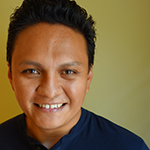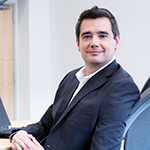There seems to be one undeniable rule in the professional world: relationships are key. That’s been true for Eduardo Guzmán. A mentor provided the young Puerto Rican with a big break—a chance to join a growing law firm and work in his native culture. As a partner at Drinker Biddle & Reath LLP, Guzmán has cultivated expertise in litigation, arbitration, telecommunications, and business law. Here, he shares how he represents the largest phone company in Puerto Rico and splits his time between the Caribbean island and Washington, DC.
Growing up, did you consider Puerto Rico part of the United States, or did you “come to the States” for college?
I lived in San Juan through high school. We are part of the United States, but everyone has a different outlook on our connection with the mainland, and that outlook is often based on politics. Puerto Rico is part of the United States, but in many ways it’s not the United States. What I mean is, we are proud US citizens, but the culture and legal systems are different.
So you always felt like part of the United States?
Absolutely, but the differences I always realized became more pronounced in my professional life. I work in both cultures now, and the legal systems, the networking, the attitudes, and the language are different. Sometimes, people are comfortable with an “American trained” lawyer who is familiar with the business world of Puerto Rico. That’s served me well because I grew up in Puerto Rico, but had the opportunity to study at Georgetown University and the University of Pennsylvania and have worked in large US law firms for 10 years now.
Other than professionally, have you stayed connected to your homeland?
I always spent summers in Puerto Rico and still go back often for work, business, and personal reasons. We have a lot of family there now, and I work there a lot. Since 1996, I’ve only lived there one full year, but there is a lot of moving back and forth. I deliberately stay connected.
You were at another firm before you joined Drinker Biddle & Reath. Tell me about that transition.
It was becoming clear to me that there were opportunities in Puerto Rico. Not only is Spanish my native language, but I had the ability to read and write legal documents in the language. I had passed the bar exam in Puerto Rico, which is in Spanish. I really understand the people, culture, and business atmosphere. I knew I could do well there, and found the chance to work with a partner who had a lot of work in Puerto Rico. The partner was Joaquin Marquez, whom I had met while studying at Georgetown. He offered me the job at Drinker to grow the practice and work on a possible succession long term.
Why did you accept the position?
I wasn’t unhappy at my previous firm, but I knew that long-term success required me to build my own network. Joaquin was offering me a ready-made opportunity with a chance to work in Puerto Rico instead of being hidden in a conference room. Instead of being attorney number 7 of 13, I was exposed, meeting people, and helping to grow a business. It was a no-brainer for a third year associate. I said, “Sure. Sign me up… let’s go!”
What else attracted you?
Those relationships mattered. I had the chance to develop my own work, and I knew I would be supported. Who are the two or three people you’ll work with every day, and will they train you and give you a shot? Those are the important questions. The people I ended up working with at Drinker did both.
Tell me about your work in Puerto Rico today.
The firm had as a client the largest telephone company in Puerto Rico, and they have been our close partner for 20 years. For me, starting with such a client meant I could plug in and meet lawyers, managers, colleagues, and competitors. It was a great way to get going. I’ve built trust with our clients and team, and being from Puerto Rico, they know I get it. For companies in Puerto Rico, and for mainland companies looking to enter the area, there is a level of comfort to working with a “local.”
How are you capitalizing on that?
We’re really helping people and corporations that want to do business in Puerto Rico, because we have the relationships and legal expertise to get them on the right path.
What do you have to do to work well in both cultures?
You have to be a master of two ways of doing things. The quality of work stays the same, but the approach changes. When you sit down with a client in Puerto Rico, you often start the conversation talking about family, not business. You might be at their home instead of at an office or restaurant. You have to understand the nuances. It’s not about your firm’s name; it’s about who you are and whether they trust you. US laws apply in Puerto Rico, but the biggest mistake you can make is to assume that doing business is the same. Successful companies and lawyers will understand and adapt to the local culture.
What else is important?
Networking and reaching out. We’re seeing more Hispanics move up the ranks, but those of us who are there can facilitate that process. When you’ve been blessed in life, there are not only opportunities, but obligations. We are trying to help Hispanics in the legal profession. It goes back to relationships, because when we don’t even know each other, it’s hard to help each other. It’s on us to build our community.

